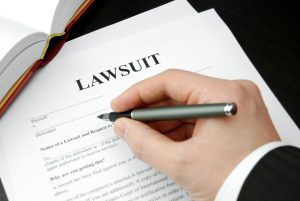By DOTTY NIST
Walton County, Fla. – Two lawsuits have now been filed challenging Walton County’s recent action prohibiting obstructions such as chains, ropes, signs and fences, from being put or left on the beach by property owners.
The lawsuits followed an amendment to the Walton County Waterways and Beach Activities Ordinance approved by the Walton County Board of County Commissioners (BCC) on June 14. The revised ordinance prohibited the placing or keeping of obstructions such as ropes, chains, signs and fences on the beach, with the exception of properly-constructed sand fences with required state and federal permits. The ordinance defined the beach as “the soft sandy portion of land lying seaward of the seawall or the line of permanent dune vegetation.”
One lawsuit, filed on July 18 in U.S. District Court in Pensacola by Fort Panic property owners Ed and Delanie Goodwin, was accompanied by a news release by one of the legal firms representing the Goodwins and generated a good deal of news coverage.
However, as of July 22 Walton County had not yet been served with the Goodwin lawsuit, according to Mark Davis, Walton County Attorney. The county had been served with the other of the two lawsuits, which had also been filed in U.S. District Court in Pensacola. The litigation was on behalf of Miramar Beach beachfront property owners Lionel and Tammy Alford.
Like the Goodwin complaint, that of the Alfords alleges violations of the U.S. Constitution by the county in connection with the prohibition action. In addition to maintaining, as the Goodwins had done, that the prohibition violates their First Amendment free speech rights, the Alfords also maintain that the county action is in violation of the Fifth Amendment and a number of sections of Florida Statutes.
“The Amended Ordinance unconstitutionally burdens free speech, including but not limited to political and religious speech,” the Alfords’ complaint reads, in reference to the alleged First Amendment violation. “On its face, and as-applied to the Plaintiffs, the Amended Ordinance illegally prohibits signs or religious signs on private property, including private property the Plaintiffs own and enjoy,” the complaint states.
“The Amended Ordinance’s blanket provisions deprive Plaintiffs of their political speech and religious speech rights without any legitimate public purpose,” the complaint also contends, alleging that, in doing so, those provisions represent a violation of Fifth Amendment prohibition on depriving any person of “life, liberty, or property, without due process of law.”
The Alford lawsuit brings up, as well, sections of Florida Statutes providing for property owners to post “no trespassing” signs and those requiring dog owners to put up signs warning the public of a “bad dog” in order for property owners with dogs to avoid liability in connection with dog bites.
Among relief requested from the court by the plaintiffs is a declaration that the amended ordinance represents a violation of the U.S. Constitution and that the measure is invalid due to conflict with Florida Statutes, along with court action to bar the county from enforcing the amended ordinance.
The plaintiffs are presented by attorneys with the Hopping Green & Sams law firm.
Last year the Alfords had filed a lawsuit challenging Walton County’s planned Hurricane & Storm Damage Reduction (WCH&SDR) Project, with U.S. District Court in Pensacola the venue for that litigation as well.
They had prevailed with a Oct. 6, 2015, court ruling that the borrow material for the project would be prohibited from being placed on their property due to its color value and Walton County’s White Sand Protection Zone requirements.
The BCC voted on March 8, 2016, to table the WCH&SDR project indefinitely as a result of an insufficient number of property owners agreeing to sign construction easements for the project.

